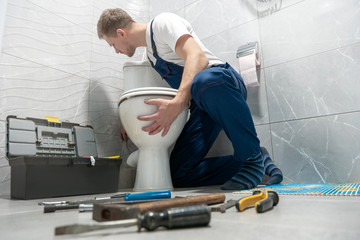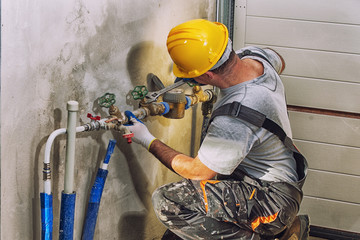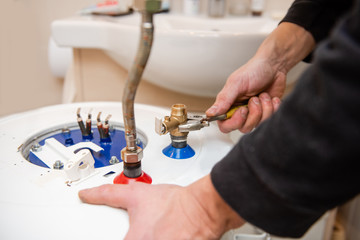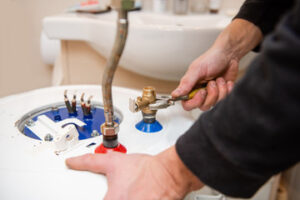Plumbing is much more than the invisible pipes that run throughout your home. It includes the fixtures and appliances that make modern life comfortable and convenient.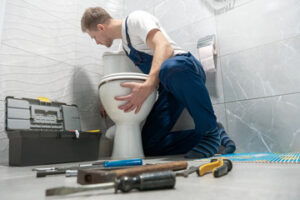
Whether you’re building a new house or renovating your existing one, it is important to understand how plumbing works. This article will discuss the three main phases of plumbing: rough-in plumbing, supply lines, and drain pipes. Visit https://www.plumbing-express.com/ to learn more.
Plumbing is an important part of the human infrastructure, delivering clean water and waste disposal services to homes and businesses. Plumbers specialize in the installation, maintenance, and repair of these systems, which are essential for ensuring safe and sanitary living and working conditions. They work with a wide range of tools and equipment to install, replace, and repair pipes, fixtures, and appliances. They also use specialized tools to identify and troubleshoot issues with leaks, clogs, and malfunctioning components. Plumbers often collaborate with other professionals, including construction teams and architects, to ensure plumbing systems are integrated seamlessly into building projects and meet all necessary regulations and standards.
Plumbers typically work in a variety of settings, from cozy homes to bustling office buildings and power plants. They often work on large-scale piping systems, and may be responsible for installing or repairing heat pumps, boilers, and other industrial equipment. They may also be called on to handle emergency plumbing tasks, such as responding to calls from homeowners or business owners to fix burst pipes or clogged drains.
Some plumbers choose to work as independent contractors rather than employees of a firm, which allows them greater flexibility in their schedule and choice of projects. They can also take on multiple clients at once, which increases their income potential. However, plumbing is a physically demanding career, and plumbers must be willing to lift heavy objects and squeeze into tight spaces. In addition, they may be exposed to dangerous chemicals and gasses, so it is important that they follow all safety protocols.
Plumbing is a highly skilled profession that requires extensive training and on-the-job experience to master the trade. It is a good idea for prospective plumbers to take classes in mathematics and science, as these skills will help them understand the technical aspects of plumbing and piping. In addition, they should learn how to read blueprints and building codes to understand the structure of a home or building. It is also important for plumbers to stay up-to-date on the latest plumbing technology and techniques. This way, they can provide their customers with the best possible service.
Plumbing and piping
The plumbing system in our homes involves the intake of clean water and the disposal of waste water. The system is made of pipes, fixtures and appliances like showers, toilets, dishwashers and washing machines. Each of these elements must perform their function without interfering with each other or creating a backflow condition. Plumbing requires the proper design, installation, testing and maintenance to ensure safe and reliable operation.
Piping is an assembly of piping components used to convey process fluid from one piece of equipment to another in a plant. The components include pipes, pipe fittings, flanges, valves, piping specials and supports. Piping systems can be constructed of a variety of materials, including copper, steel, plastic, and concrete. The engineering design of piping is typically conducted by a qualified piping designer who follows applicable ASME codes.
Plumbers must be able to read blueprints and understand the physical dimensions of piping systems. They must also be able to make accurate measurements and determine the best location for pipe connections. They may also be responsible for writing specifications, preparing material lists and data sheets, and performing quality reviews like discipline and inter-discipline checks on detailed engineering documents.
Some plumbers are independent contractors and can set their own hours. This can provide flexibility and a better work-life balance. However, it’s important for plumbers to keep up with new technology and techniques in order to maintain their skills and advance in the industry.
Plumbing has a long and rich history, from ancient civilizations’ efforts to manage water supplies to modern innovations that focus on sustainability and efficiency. From aqueducts and clay pipes to the widespread use of iron pipes and flush toilets, plumbing has revolutionized our relationship with this precious resource.
In addition to providing fresh, clean water for drinking and cooking, our plumbing systems help remove sewage and other wastes, protect us from dangerous contaminants, and control flooding and erosion. A faulty plumbing system can cause serious damage to your home or business, so it’s important to have yours checked regularly by a professional plumber. A good plumber can also give you advice on how to reduce your water usage, which can help save you money on utility bills.
Faucets
Faucets are the part of your plumbing system that you use to control the water flow and temperature. They are typically located on or near sinks in bathrooms and kitchens. There are a variety of different faucet types available, including single hole faucets and wall-mounted faucets. Single-hole faucets are usually installed into a single hole on the back of the sink or vanity, while wall mounted faucets require a separate hole in the wall to mount them. Each type of faucet has its own unique features and benefits.
One of the most common problems with faucets is sputtering water. Sputtering is caused by air in your pipes, which can cause the water pressure to drop. Fortunately, there are several ways to fix this problem. One way is to open the faucet completely and allow air to escape. This will help restore the water pressure and prevent future sputtering. Another way to fix this issue is to open the valve on the bottom of your faucet and bleed the air from the line.
Many older homes have water supply lines that are made from galvanized steel. These lines are susceptible to corrosion, which can lead to leaks and other problems with your plumbing system. Luckily, it is possible to replace these old lines with copper piping. This will not only increase your home’s value, but it will also improve the quality of your water.
If you are installing a new faucet in your bathroom, be sure to choose a style that fits the space. The faucet should be the right size for your sink, and it should be easy to reach. It is also important to ensure that the faucet is compatible with your existing water line. Before you start installing your new faucet, you should measure the center points of your sink or vanity. These measurements will determine the type of faucet you can install.
Faucets are one of the most popular innovations in plumbing, but they can be difficult to understand if you don’t know what they do. This guide from Formica Plumbing & Sewer Co will explain how faucets work, and what you need to know before making a purchase.
Plumbing systems
Plumbing systems are intricate networks of pipes, fixtures and appliances that supply water and remove wastewater in residential and commercial buildings. They are essential to our daily lives and the comfort of modern living, but they can pose a challenge when problems occur. Understanding the basics of plumbing can help you address problems more quickly and make better choices when it comes to maintenance and repairs.
Pipes are the most important component of a plumbing system. They transport water and sewage between points of use in a building and are typically made of galvanized steel, copper or PVC. Properly installing and repairing pipes can ensure that they do not leak or burst.
A residential plumbing system consists of two separate subsystems: the water supply system and the drain system. The water supply system includes the pipes that bring freshwater into the house, while the drainage system carries wastewater away. Both systems consist of a network of pipes, but the difference is that the water supply system uses pressure to push water through at a faster rate while the drainage system relies on gravity and a series of traps and vents to move wastewater.
Fixtures and appliances are the parts of a plumbing system that are visible to homeowners, and they include sinks, toilets, tubs, showers and water heaters. These components are necessary for comfortable, modern living, but they also require regular maintenance and occasional repairs to function properly. High-quality fixtures and appliances can help reduce water consumption and improve the overall efficiency of a plumbing system.
Valves serve a variety of functions in plumbing systems, from shutting off the water supply in case of a leak to regulating water pressure. They are also important for ensuring that water flows in the correct direction, and they are available in a variety of styles to meet different needs.
A plumbing system also contains a number of accessories, such as water meters, pressure regulators and backflow preventers. The water meter measures the amount of water used, while the pressure regulator keeps the water at an optimal level to avoid damage to fixtures and appliances. A backflow preventer protects the plumbing system from contaminated water that could cause illness or death.
